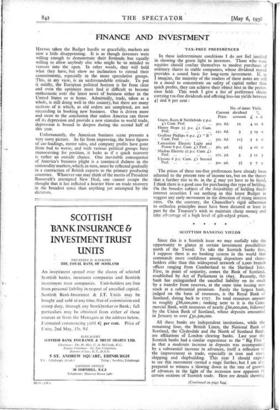FINANCE AND INVESTMENT
HAVING taken the Budget hurdle so gracefully, markets are dow a little disappointing. It is as though investors were willing enough to demonstrate their fortitarlo, but equally willing to allow, anybody else who might be So minded to venture into the open. In other words, they will hold what they have, but show no inclination to extend their commitments, especially in the more speculative groups. This, in my view, is an understandable attitude. To put it, mildly, the European political horizon is far from clear and even ' the optimists must find ' it 'difficult to become enthusiastic over the latest news of business either in the United States or at home.. AdmittecilY, _trade," taken as a whole, is still doing well in this country; but there are many sections of it which, as old orders are completed, are not succeeding in booking new business. One is driven more and more to the conclusion that unless America can throw off its depression and provide a new stimulus to world trade, d.epression is bound to deepen during the second half of this year.
Unfortunately, the American business scene presents a very sorry picture. So far from improving, the latest figures of car-loadings, motor sales, and company profits have gone from bad to worse, and with various political groups busy manoeuvring for position, it looks as if a quick recovery is rather an outside chance. One inevitable consequence of America's business plight is a contimrd dulness in the commodity markets, which, in turn, must be reflected gradually in a contraction of British exports to the primary producing countries. Whatever one may think of the merits of President Roosevelt's attempted New Deal, one cannot escape the thought that it has inflicted a heavier blow on trade recovery in the broadest sense than anything yet attempted by the dictators.


































































 Previous page
Previous page